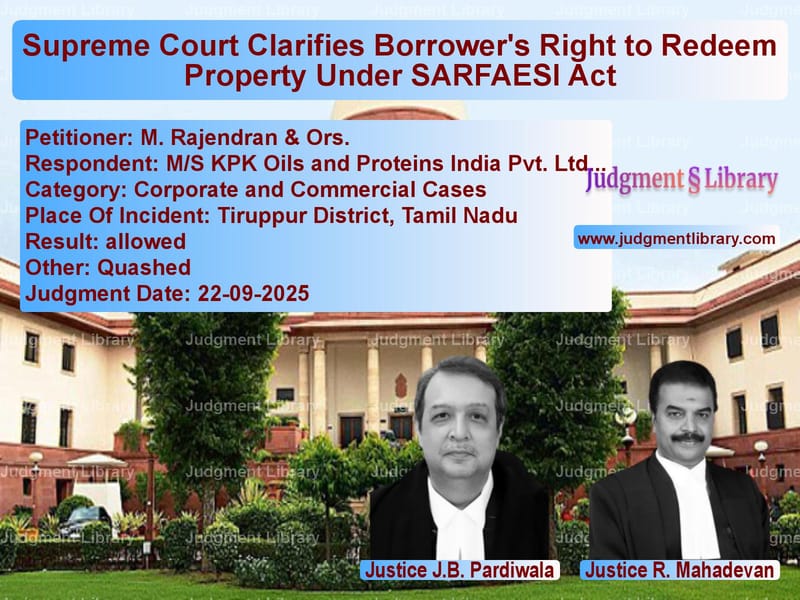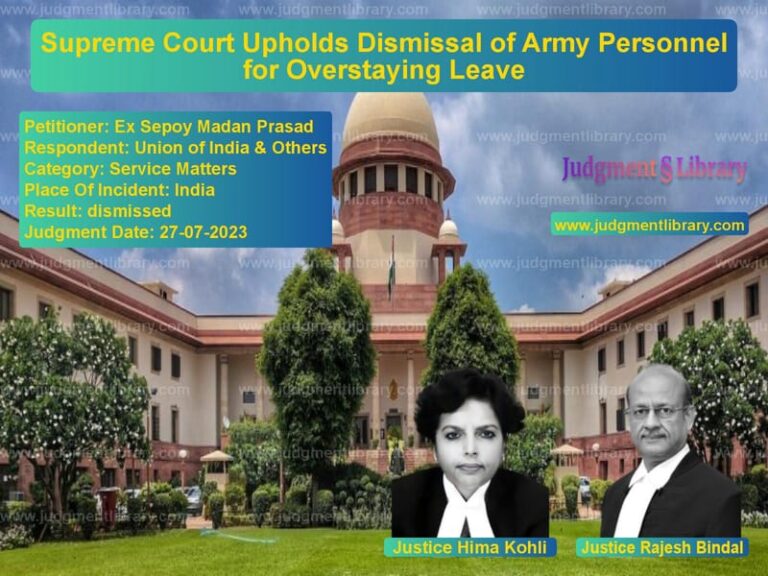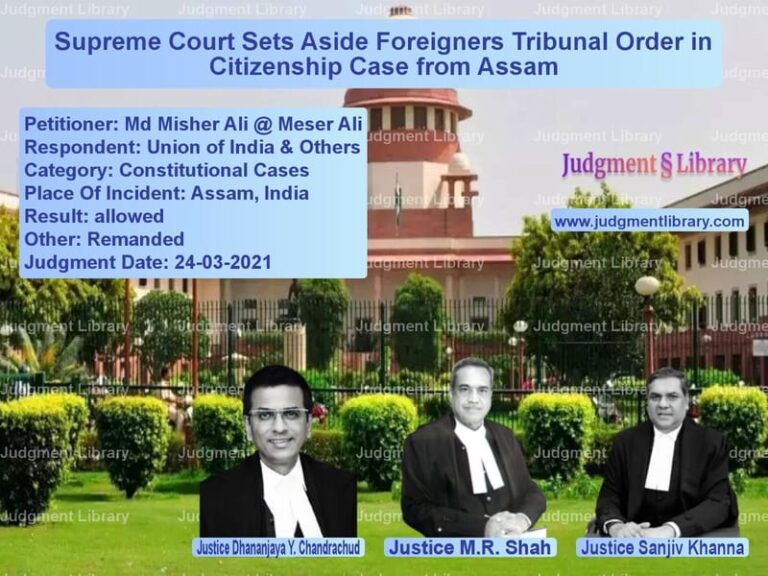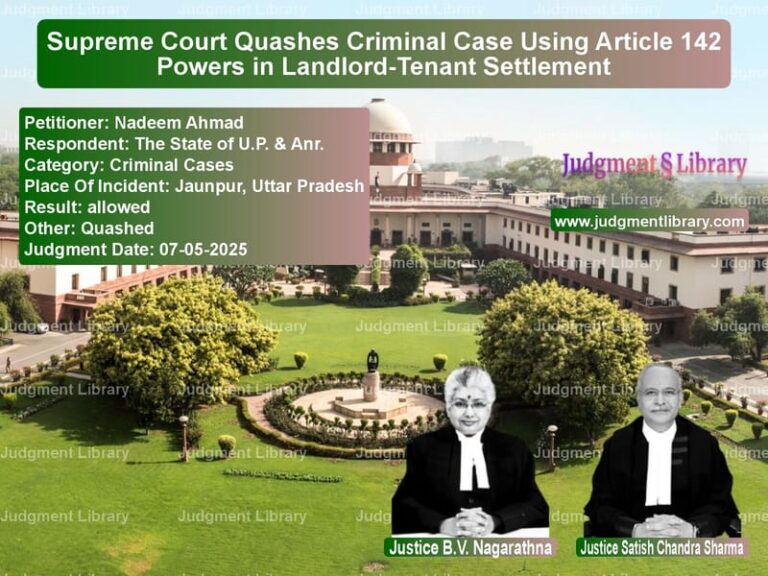Supreme Court Clarifies Borrower’s Right to Redeem Property Under SARFAESI Act
The Supreme Court of India recently delivered a landmark judgment that brings much-needed clarity to the rights of borrowers and auction purchasers under the SARFAESI Act. The case involved M. Rajendran and other auction purchasers who had successfully bid for a property that was later claimed back by the original borrowers, M/S KPK Oils and Proteins India Pvt. Ltd., through a writ petition in the Madras High Court.
The dispute centered around a crucial question: until when can a borrower exercise the right to redeem a mortgaged property after defaulting on loan repayments? The answer to this question has significant implications for banks, financial institutions, borrowers, and auction purchasers across the country.
The Factual Background
The story begins on January 6, 2016, when KPK Oils and Proteins India Pvt. Ltd. availed cash credit facilities of Rs. 5 crore and a term loan of Rs. 30 lakh from the bank. To secure this loan, the borrowers created an equitable mortgage over various immovable properties, including vacant dry land measuring 1.92 acres in Tiruppur District, Tamil Nadu.
When the borrowers defaulted on their repayments, the bank classified their account as a Non-Performing Asset (NPA) on December 31, 2019. Following the due process under the SARFAESI Act, the bank issued a demand notice under Section 13(2) on February 12, 2020, for outstanding dues of approximately Rs. 3.96 crore.
After the borrowers failed to respond to the notice, the bank proceeded to take possession of the secured asset and published a possession notice in newspapers on October 31, 2020. The bank then issued an auction sale notice on January 22, 2021, which was also published in newspapers two days later.
On February 26, 2021, M. Rajendran and other appellants participated in the auction and successfully bid for the property for Rs. 1.25 crore. They deposited the entire sale consideration by March 20, 2021, and the bank issued a sale certificate in their favor on March 22, 2021.
Interestingly, around the same time in March 2021, the borrowers paid Rs. 2.88 crore towards the outstanding dues, and later on May 7, 2021, paid another Rs. 62.74 lakh to release other properties. The bank subsequently closed the loan account of the borrowers.
The Legal Battle
Despite the sale being completed, the borrowers approached the Madras High Court through a writ petition, challenging the sale certificate. The High Court, in its order dated April 24, 2023, allowed the writ petition and quashed the sale certificate issued to the auction purchasers. The court directed the bank to permit the borrowers to redeem the mortgage and close the loan account.
The High Court based its decision on the premise that the right of redemption under Section 13(8) of the SARFAESI Act was no longer res integra (a matter already decided) in view of the Supreme Court’s decision in Mathew Varghese v. Amritha Kumar. The court held that “the auction purchasers will be entitled for the return of the entire sum of Rs.1,25,60,000 paid by them and they will also be entitled to interest at the rate of 9% per annum from the date of remitting the amounts till the date of repayment.”
Aggrieved by this decision, the auction purchasers approached the Supreme Court.
Arguments Before the Supreme Court
Before the Supreme Court, Ms. Praveena Gautam, the learned counsel appearing for the auction purchasers, vehemently submitted that the High Court committed an egregious error in entertaining the writ petition and passing the impugned judgment and order. She argued that the issues involved in the present appeal were now covered by the Supreme Court’s decision in Celir LLP v. Bafna Motors (Mumbai) Private Ltd.
On the other hand, Mr. Huzefa Ahmedi, the learned counsel appearing for the borrowers, opposed the appeal and submitted that the principles enunciated in Bafna Motors were not applicable in the facts and circumstances of the present case. He contended that since the loan was obtained on January 6, 2016, while Section 13(8) was amended with effect from September 1, 2016, the amended provision would not have retrospective operation.
The Supreme Court’s Analysis
The Supreme Court, comprising Justices J.B. Pardiwala and R. Mahadevan, delved deep into the legislative history and scheme of the SARFAESI Act. The court noted that the SARFAESI Act was enacted to empower banks and financial institutions to take possession of securities and sell them without court intervention, addressing the problem of mounting non-performing assets.
The court examined the crucial provision at the heart of the dispute – Section 13(8) of the SARFAESI Act, which deals with the borrower’s right of redemption. The provision, after its amendment in 2016, reads: “Where the amount of dues of the secured creditor together with all costs, charges and expenses incurred by him is tendered to the secured creditor at any time before the date of publication of notice for public auction or inviting quotations or tender from public or private treaty for transfer by way of lease, assignment or sale of the secured assets… the secured assets shall not be transferred…”
The court observed that the amended provision brought about a significant change in the borrower’s right of redemption. While under the unamended provision, the borrower could redeem the property until the date fixed for sale or transfer, the amended provision curtailed this right to the date of publication of notice for public auction or other modes of transfer.
The Supreme Court made several important observations in its judgment. The court noted that “the amended provisions of Section 13(8) of the SARFAESI Act, make it clear that the right of the borrower to redeem the secured asset stands extinguished thereunder on the very date of publication of the notice for public auction under Rule 9(1) of the 2002 Rules.”
The court further elaborated that “in effect, the right of redemption available to the borrower under the present statutory regime is drastically curtailed and would be available only till the date of publication of the notice under Rule 9(1) of the 2002 Rules and not till the completion of the sale or transfer of the secured asset in favour of the auction-purchaser.”
Addressing the borrowers’ contention about retrospective application, the court held that “the amended provision extinguishes the right of redemption of the borrower in the event he fails to repay his dues and redeem the asset before publication of the Auction Notice. This unambiguous language used in the amended provision of Section 13(8) furthers the object and reasons of the SARFAESI Act for which it was enacted i.e., to ensure that the lender is able to enforce his security interest at the earliest and with least possible intervention of the courts.”
The court also clarified the scheme of notices under the SARFAESI Rules, holding that “Rule(s) 8(6), the Proviso thereto, Rule 8(7) and Rule 9(1) of the SARFAESI Rules respectively do not speak of any separate or distinct notice of sale that is required to be issued by the secured creditor for the transfer of the secured asset.” The court explained that these provisions refer to a single composite notice of sale that may be served in different ways depending on the mode of sale chosen.
The Final Ruling
In its final conclusion, the Supreme Court allowed the appeals filed by the auction purchasers and set aside the judgment of the Madras High Court. The court held that the borrowers’ right to redeem the secured asset stood extinguished on January 22, 2021, when the auction notice was published.
The court made it abundantly clear that “if any third party rights have been created over the said secured asset, the same would be non-est in view of this judgment.” The court also warned that if there was any obstruction in handing over possession to the auction purchasers, it would take strict action against such persons.
Interestingly, the court expressed concern about the ambiguities in the SARFAESI Act and Rules, noting that “the interpretative deadlock between the provision and the rules has single handedly resulted in a huge mess insofar as the enforcement of security interest is concerned, leading to an endless pipeline of litigation thereby clogging the specialized forums.” The court humbly urged the Ministry of Finance to take a serious look at these provisions and bring about necessary changes.
This judgment brings much-needed clarity to the rights of borrowers and auction purchasers under the SARFAESI Act. It establishes that once an auction notice is published, the borrower’s right to redeem the property is extinguished, providing certainty to the auction process and protecting the interests of bona fide auction purchasers. The decision reinforces the objective of the SARFAESI Act – to facilitate expeditious recovery of bad debts without unnecessary litigation.
Petitioner Name: M. Rajendran & Ors..Respondent Name: M/S KPK Oils and Proteins India Pvt. Ltd. & Ors..Judgment By: Justice J.B. Pardiwala, Justice R. Mahadevan.Place Of Incident: Tiruppur District, Tamil Nadu.Judgment Date: 22-09-2025.Result: allowed.
Don’t miss out on the full details! Download the complete judgment in PDF format below and gain valuable insights instantly!
Download Judgment: m.-rajendran-&-ors.-vs-ms-kpk-oils-and-pro-supreme-court-of-india-judgment-dated-22-09-2025.pdf
Directly Download Judgment: Directly download this Judgment
See all petitions in Debt Recovery
See all petitions in Banking Regulations
See all petitions in Property Disputes
See all petitions in Contract Disputes
See all petitions in Corporate Compliance
See all petitions in Judgment by J.B. Pardiwala
See all petitions in Judgment by R. Mahadevan
See all petitions in allowed
See all petitions in Quashed
See all petitions in supreme court of India judgments September 2025
See all petitions in 2025 judgments
See all posts in Corporate and Commercial Cases Category
See all allowed petitions in Corporate and Commercial Cases Category
See all Dismissed petitions in Corporate and Commercial Cases Category
See all partially allowed petitions in Corporate and Commercial Cases Category







